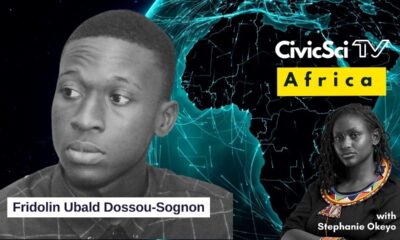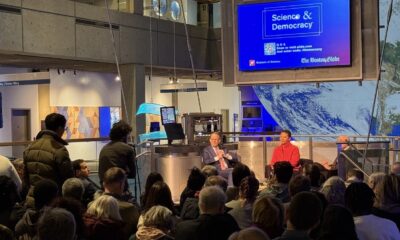Stories in Science Special Series
My Stolen Identity: I Was Told That Science Was Not Meant For Me
Pei Qin (Sabrina) Ng – My persistence in science enraged my biology teacher. Every lesson, she publicly shamed me in front of the class, proclaiming how bad I am at science, especially biology. She warned my classmates that they were in bad luck if we were in the same group for a science project.

Pei Qin (Sabrina) Ng
[su_boxbox title=”About”]Pei Qin (Sabrina) Ng is currently a PhD candidate in bioinformatics and epigenetics at The University of Adelaide, South Australia, Australia. Originally from Malaysia, she has travelled abroad to pursue her dream to study genetics. She is a woman in a lab coat that loves to code, travel, write, and boulder. You can follow her science journey on twitter @PNgsabrina or her blog “The Dataminer’s Diary” at https://peiqinsabrina.wordpress.com. The story below was edited by Emily Sherman.[/su_boxbox]
[su_boxnote note_color=”#d9d8d6″]Key Points
- Hardships help build resilience and determination to conquer challenges, including mental bullying.
- No one knows you better than you know yourself. Do not let other’s voices and perspectives define who you are.
- Science has no boundaries – it is for someone who loves what they do.[/su_boxnote]

Pei Qin (Sabrina) Ng
[dropcap]T[/dropcap]he first time I was introduced to genetics was during a high school biology lesson. I still remember how enchanting that first glimpse of the double helix structure was: the code of life, right before my eyes. My interest was sparked, and I have been infatuated with genetics ever since. For the rest of high school, I eagerly awaited biology lessons and practicals. I did pre-lecture readings, made notes, and set myself up to dive into the world of genetics and other biological sciences.
As long as I am passionate about what I do, I will be good at it. I have always believed that, and that is the same belief I hold today as I approach learning and mastering new science.
My high school biology teacher back in Malaysia, however, challenged my beliefs when I was just starting out. She asked me to stay after class to give me feedback on my poor performance on a biology practical.
“Listen to me, Pei Qin. You are not gifted to do science. Why can’t you just accept the fact that you were born this way?”
I was puzzled by what she said. Why am I not meant to do science, just because I failed to isolate a cloud of DNA using a mixture of ethanol and isopropanol from a strawberry? While yes, it is a fruit with eight copies of its DNA material that was thought to be easy for DNA isolation, I thought to myself: it is okay to fail, I can always reflect on my mistakes and try again. Unfortunately, my biology teacher did not think that way.
I refused to take her discouraging words and continued my obsession with science. I stayed back in the library after school, reading the Campbell Biology university textbook to quench my curiosity and inquisition.
If no one is going to teach me, I am going to teach myself.
My persistence in science enraged my biology teacher. Every lesson, she publicly shamed me in front of the class, proclaiming how bad I am at science, especially biology. She warned my classmates that they were in bad luck if we were in the same group for a science project. She refused to hand me a copy of the dissection notes for our mouse dissection practical. She instilled fear in others to share notes with me, as my classmates were worried that they would fail their assessment. It got so bad that even my own friends refused to share their notes with me.
Being sequestered from resources caused substantial mental stress for me. Furious with the situation at hand, I was determined to prove them wrong.
I taught myself how to do mouse dissections through watching Youtube videos uploaded by universities, and read notes that I found online posted by university students. When the day of the exam arrived, I heard my classmates whispering how terribly I was going to fail without any help from my teacher nor my classmates.
My hard work and determination paid off. I topped the class as the first student who finished the dissection in the shortest time, with the most accurate examination of the different mouse organs for the practical.
Despite proving my high school biology teacher wrong and constantly communicating my improvements and new knowledge, she refused to acknowledge that I was capable of excelling in science. In fact, she suggested that I was better off pursuing law or teaching.
Although I graduated from high school as a mediocre student and my passion for genetics was a laughing stock among teachers, I did not let others’ perception of me diminish my love for genetics. I left Malaysia to pursue my tertiary education in Adelaide, South Australia. I enrolled myself in a science degree, and then acquired a conditional offer to transfer to an advanced science degree if I aced my first semester courses with minimum all distinctions. Fast-forward three years, and I graduated with a Bachelor of Science (Advanced) and was offered a place to immediately start a Masters in genetics on a full scholarship.
Today, I am doing a PhD in plant epigenetics and bioinformatics. My research is focused on using computational analysis to understand the functional roles of small RNAs in plants. The role of small RNAs is not to be underestimated: research has shown that they play a great role in regulating growth and development in most complex organisms, including humans. However, there is so much more to explore, and computational power allows us to do so. I am always fascinated by what these small molecules can do, as it reminds me of my motto in science: No matter how “small” you may think you are, your work will always make a significant difference to the understanding of the molecular world.
Ultimately, I am thankful for the experience of being denied of exploring and developing my scientific identity at such a formative stage. That hardship strengthened my willpower and determination to pursue science. Because I was thrown into the deep end, I am now a more resourceful and resilient in person that is ready to persevere in order to achieve my goals and dreams. People’s words and definitions of what and who I should be almost diminished my identity as a scientist. Those adversities made me stand firm and work harder to be closer to the person I imagine myself to be, and have contributed to the person that I am today.
America Ferrera said, “My identity is not my crisis. My identity is my superpower.”
My identity?
A woman in science.
Image by Jonny Lindner from Pixabay
Metrics
Sessions
Total number of Sessions. A session is the period time a user is actively engaged with the page.
Visitors
Users that have had at least one session within the selected date range. Includes both new and returning users.
Page views
Pageviews is the total number of time the article was viewed. Repeated views are counted.
The CS Media Lab is a Boston-anchored civic science news collective with local, national and global coverage on TV, digital print, and radio through CivicSciTV, CivicSciTimes, and CivicSciRadio. Programs include Questions of the Day, Changemakers, QuickTake, Consider This Next, Stories in Science, Sai Resident Collective and more.

-
 Audio Studio1 month ago
Audio Studio1 month ago“Reading it opened up a whole new world.” Kim Steele on building her company ‘Documentaries Don’t Work’
-
Civic Science Observer1 week ago
‘Science policy’ Google searches spiked in 2025. What does that mean?
-
Civic Science Observer1 month ago
Our developing civic science photojournalism experiment: Photos from 2025
-
Civic Science Observer1 month ago
Together again: Day 1 of the 2025 ASTC conference in black and white
Contact
Menu
Designed with WordPress
























